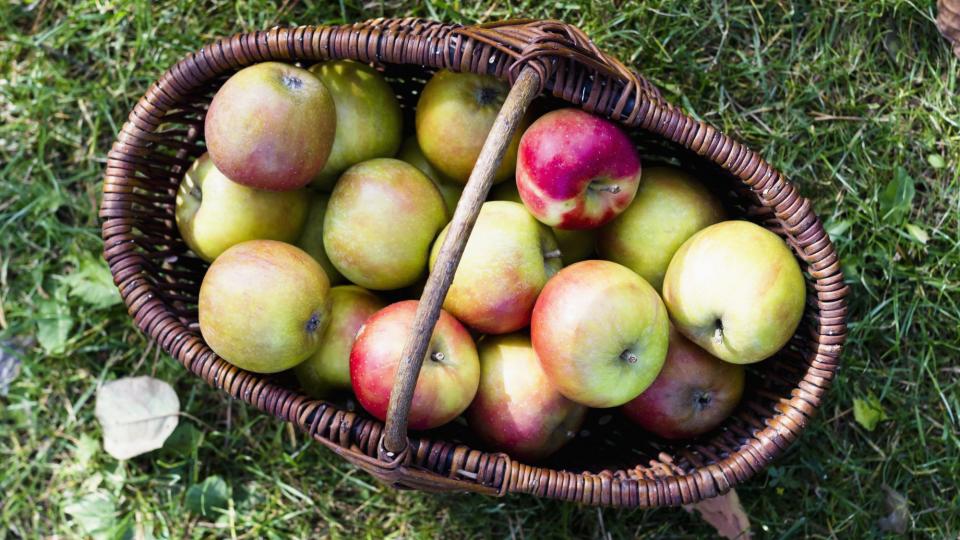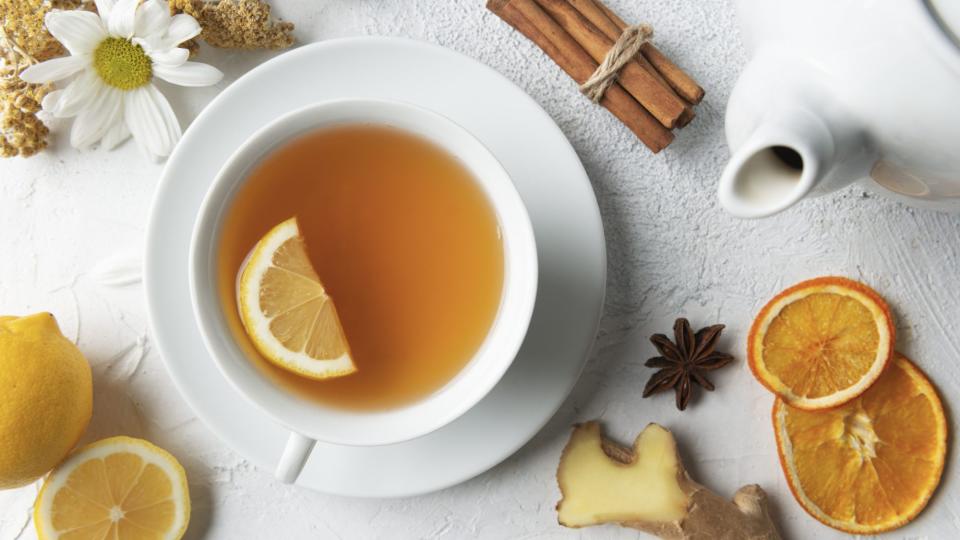5 Nutritious Fall Foods You Should Be Eating, According to a Registered Dietitian

As we move into the cooler months, we are often drawn to familiar, seasonal flavors (pumpkin spice, anyone?) and comforting, warming meals. At the same time, we are also starting to think about maintaining our health through the cold and flu season, this year perhaps more than ever. The good news is that many of the foods we already associate with fall also pack some serious health benefits. We asked Rebecca Ditkoff, MPH, RD, founder of Nutrition by RD, to give us the full run-down on the foods to rely on this autumn for optimal wellness.
RELATED: 9 Myths About Immune-Boosting Foods That Health Experts Want You to Stop Believing
When it comes to eating to support the immune system, Ditkoff reminds us that variety is key. "To stay as healthy as possible, eating a balanced and varied diet full of fruits and vegetables is the most important overeating any one food," she says. With that in mind, here are five foods to include in your rotation to help keep you on track for a healthy and delicious fall.
Pumpkin
If you never give pumpkin much thought (other than your once-yearly slice of pumpkin pie), the orange globes offer a multitude of health benefits. According to Ditkoff, the beta-carotene that gives pumpkin its signature hue also serves as an antioxidant. "Consuming beta-carotene can help reduce the risk of developing certain cancers, may offer protection against asthma and heart disease, and may decrease the risk of macular degeneration." If that wasn't enough, pumpkin is also a great source of fiber. Ditkoff recommends sneaking it into chocolate brownies, overnight oats, pancake batter, and muffins for some added nutrition and a moisture boost.
RELATED: 25 Perfect Pumpkin Recipes You'll Want to Eat All Year Round

Root Vegetables
Roasted root vegetables are one of the joys of fall cooking. Is there anything better than savory rosemary beets and carrots or perfectly crispy roasted potatoes? According to Ditkoff, those tasty root vegetables are nutrition powerhouses full of antioxidants. They also serve as good sources of vitamins A and C, which help support the immune system as we enter the cold and flu season. Other root veggies you can consider including in your diet are carrots, jicama, radishes, rutabaga, parsnips, and celeriac, many of which you can find grown locally at the farmers' market or grocer that highlights regionally grown produce.
RELATED: 12 Healthy Roasted Vegetable Recipes That Practically Cook Themselves

Apples
Depending on where you live, apple picking might be a favorite fall activity. Or perhaps you just enjoy the crunch of a perfect Honeycrisp or the subtle sweetness apples lend to baked goods. Either way, it turns out the old adage is true: an apple a day is beneficial for your health.
According to Ditkoff, fiber is the star of the show when it comes to apples, as they contain four grams per serving." Diets rich in high-fiber foods like fruits, vegetables, whole grains, and beans are tied to a lower risk for heart disease, type 2 diabetes, and even breast and colorectal cancers."
And don't peel before eating! "The skins of apples are rich in polyphenols and antioxidants that are known to help protect against oxidative stress, which is associated with many chronic diseases," she adds.
RELATED: 45 Festive, Flavorful Apple Recipes to Make This Fall

Winter Squash
Butternut, acorn, kabocha, spaghetti squash, delicata … the list of winter squash is long, varied, and delectable. And luckily for you, they are excellent foods to include in your fall diet. "There is about 500 milligrams of potassium in one cup of cooked butternut or acorn squash, which can help to counteract the negative effects that salt has in those with high blood pressure," explains Ditkoff.
There are additional benefits from eating vegetables like winter squash in the autumn months. "Seasonal produce is generally harvested at its peak so it retains its full nutrient and vitamin content," Ditkoff says. "It is even more beneficial if the in-season produce is bought locally since the nutrients have less travel time to degrade before reaching your plate." Seasonal produce also tends to taste better and have a lower carbon footprint than fruits and veggies that have traveled a long distance to get to you.

Cinnamon
It turns out that the quintessential fall spice does more than just add the perfect touch to pies and lattes.
One distinction to note is that there are two main types of cinnamon: cassia cinnamon and Ceylon cinnamon, each with its own associated health benefits. "The research is still preliminary, but there's some research showing that cinnamon—particularly Cassia cinnamon—may be helpful for those with insulin resistance or type 2 diabetes," says Ditkoff. Even if you don't suffer from one of those conditions, cinnamon could help you maintain blood sugar levels.
Try adding a few shakes to your coffee or tea, taking over-the-counter capsules, or adding it to roasted vegetables for the perfect seasonal side dish.


